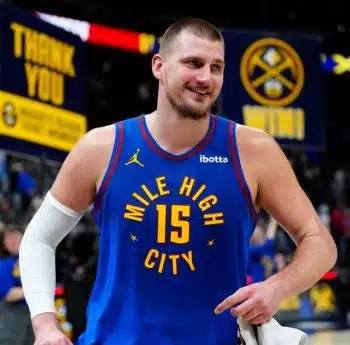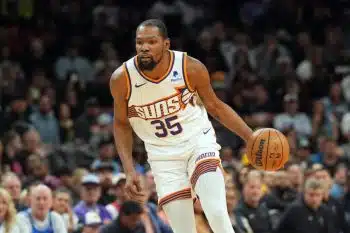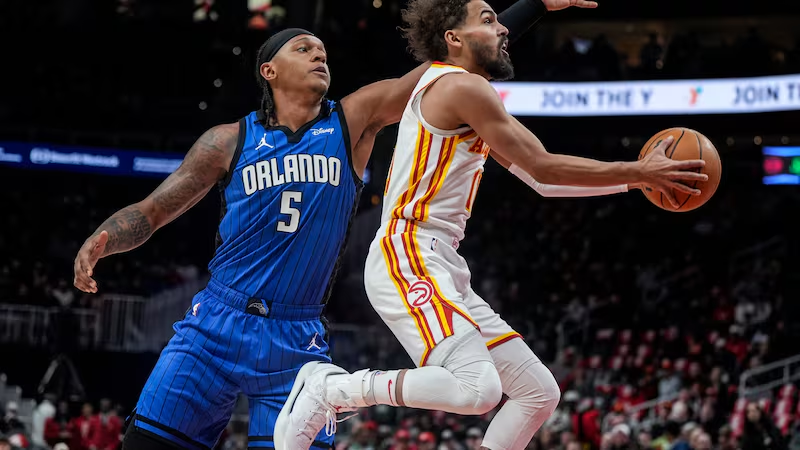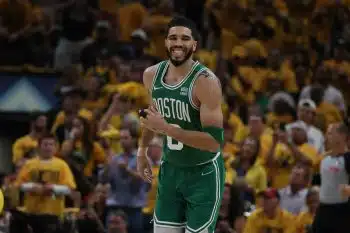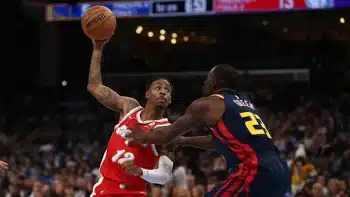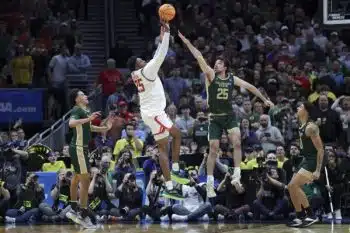NBA
How Key Buyout Players May Impact Playoffs
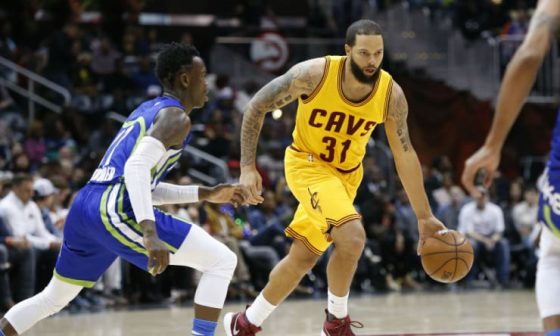
The NBA playoffs are looming.
Each season, after the trade deadline, several players are bought out of the remainder of their contracts, allowing them to sign with other teams. These buyout players tend to go from poorly performing teams that do not have playoff aspirations, and may be aiming for a better position in the draft lottery, to teams competing for an NBA championship. During buyout season, good teams (sometimes) get better, or as they say, the rich get richer.
With this in mind, we turn to this year’s key buyout acquisitions to see how they may affect the upcoming 2016-2017 playoffs:
Deron Williams, Cleveland Cavaliers
On January 23rd, when speaking to the media, LeBron James stated “We need a fu—-g playmaker. …I’m not saying you can just go find one like you can go outside and see trees. I didn’t say that.”
While speaking to Zach Lowe of ESPN on March 6, Cavaliers General Manager David Griffin echoed these sentiments, stating the team searched for a capable guard throughout the season.
“We certainly tried all year to add a point guard and a big,” Griffin said. “I think we were at a point at the [trade] deadline where we knew we could acquire someone and made a value judgment [that it was] worth waiting to wait for [the] buyout market.”
With the trade deadline passed, the type of player both James and Griffin sought suddenly became available.
“Deron [Williams] literally fell in our lap that way,” Griffin said.
With that, the Cavaliers found the additional playmaker James had publicly requested.
In 40 games with the Dallas Mavericks this season, Williams averaged 12.8 points (his lowest scoring average since his rookie season) and 6.9 assists per game while shooting 43 percent from the field and 34 percent from three-point range. Williams’ assist and shooting percentages are on par with recent years, although his overall scoring decreased significantly in his 12th season in the NBA.
In five games with the Cavaliers, Williams is playing 20.2 minutes compared to 29.3 minutes per game with the Mavericks. In addition, he has only hit one three-pointer with the Cavaliers despite his 1.6 attempts per game. These misfires include a potential go-ahead corner three-pointer directly from LeBron James. Although the shot didn’t go in, Williams is already gaining valuable crunch time experience playing alongside James, which could prove valuable in the postseason.
Williams has struggled with injuries throughout his career, so his durability will be a concern going forward. However, based on talent and experience, Williams is clearly an upgrade over the Cavaliers’ other options at backup point guard and will likely play a crucial role for Cleveland as they make another run for an NBA title.
Matt Barnes, Golden State Warriors
Matt Barnes joins the Warriors after an interesting series of events. The team had previously committed to recent buyout guard Jose Calderon. However, on February 28, Kevin Durant suffered a knee injury, which forced a change of plans and led to the signing of Barnes, who had recently been released by the Sacramento Kings.
Although it has been almost 10 years since he previously played with the Warriors, Barnes expressed his excitement upon signing.
“I’m at a loss for words right now, next to the birth of my children this is the happiest day of my life!! Coming back to where it all started,” Barnes exclaimed.
With the Kings, Barnes averaged 7.6 points on 38.4 percent shooting and 32.3 percent on three-pointers — relatively low marks for a wing player. However, Barnes had been rebounding (5.5 per game) and assisting (2.8 per game) at near career-high levels in 25.3 minutes per game.
Through four games, Barnes has played a total of 62 minutes for the Warriors. He is averaging 2.5 points, 3.5 rebounds and 1.8 assists and is shooting 25 percent from the field and 22 percent on three-pointers. Obviously, this is a very, very small sample size, but Barnes hasn’t necessarily hit the ground running in Golden State. As Barnes gets more acclimated to his new team, its system and builds some confidence, he’ll likely get closer to his career averages.
So while it’s abundantly clear that Barnes simply cannot replace Durant’s production, Barnes can contribute in other ways. Former teammate Los Angeles Clippers Forward Blake Griffin explained some of what Barnes brings to the table.
“He was kind of a guy you could always count on to be in the right spot at the right time,” Griffin said. “There were a couple of plays I’d be trapped in the post and he’d cut down the middle, perfect timing. Things like that.”
Ideally, Durant will be healthy in time for the playoffs and Barnes will simply serve as an insurance policy. However, if Durant is limited or can’t return in time, Barnes will need to sharpen his game and be prepared to play a crucial role for the league’s best team.
Brandon Jennings, Washington Wizards
The Washington Wizards have been a pleasant surprise this season. They have rebounded from missing the playoffs last season to currently being third in the Eastern Conference. With a potential deep playoff run looming, the team has been bolstered by the return of big man Ian Mahinmi, the trade for Bojan Bogdanovic and the buyout acquisition of Brandon Jennings.
With this acquisition, the Wizards have added a reliable lead guard and talented scorer. For reference, on January 31, Jennings scored 32 points in a road game against the Houston Rockets. With the New York Knicks, Jennings, in 23.8 minutes per game, averaged 8.6 points while shooting 38 percent from the field and 34 percent on three-point attempts. Although his shooting percentages have remained stable over his career, he is far removed from the first six seasons of his career where he averaged between 15.4 and 19.1 points per game. Part of that dip in scoring is likely a result of Jennings’ Achilles injury in 2015, but he has shown that he is still capable of putting up meaningful numbers with some regularity.
In four games, Jennings is averaging two points on 25 percent shooting and has yet to hit a three in 12.3 minutes of action per game. This sample size is quite small and with 20 games remaining, there is time to ease Jennings into the mix and unlock his scoring potential.
For more insight on Washington’s acquisition of Jennings, take a look at this article by Basketball Insider’s Benny Nadeau.
Jose Calderon, Atlanta Hawks
Jose Calderon made headlines when the Warriors signed Matt Barnes due to the injury Durant suffered the day before Calderon was supposed to sign with Golden State. The Warriors signed Calderon to ensure that he would be paid then subsequently waived him.
On March 3, the Atlanta Hawks claimed Calderon off waivers.
“We feel fortunate to be able to add a player of Jose’s caliber at this point in the season,” Hawks Coach Mike Budenholzer said shortly after acquiring Calderon.
In his 24 games with the Lakers, Calderon averaged 3.3 points and 2.1 assists per game. His per-minute averages aren’t particularly great either, as he averaged just 9.5 points and 6.2 assists per 36 minutes. In his 12th season and at 35 years old, there is plenty of reason to question Calderon’s ability to contribute moving forward.
Malcolm Delaney, a 27-year-old rookie point guard, has played a significant backup role for the Hawks this season. In 63 games, Delaney is averaging 5.6 points and 2.7 assists on 38.2 percent shooting. These numbers aren’t great and Coach Budenholzer was clearly looking for some veteran experience at point guard, which explains his interest in Calderon.
With Budenholzer talking about Calderon’s shooting and experience while remaining noncommittal regarding the position, there appears to be an open competition leading into the playoffs. Although Calderon’s statistics have not been great this season, he did shoot 42 percent on three-pointers with the Lakers.
Recently, Coach Budenholzer benched starting point guard Dennis Schroder in a competitive game against the Warriors when Schroder and Hawks center Dwight Howard began to exchange words on the court. The exchange, during live play, led to a wide open three-pointer for Warriors point guard Stephen Curry. Between this recent issue with Schroder and the need for more production at backup point guard, Calderon has a potential role to fill for Atlanta. However, based on his recent production, his age, lack of defensive impact and recent arrival, it’s not likely that he’ll be the solution for Atlanta.
Andrew Bogut, Cleveland Cavaliers
The Cavaliers landed Bogut in the buyout market as a potential rim protector and anchor on defense. Bogut was considering several teams but ultimately chose Cleveland, later explaining that he felt it was the best fit for him.
Bogut had been dealing with nagging injuries and had only started 21 games for the Dallas Mavericks. Per 36 minutes, Bogut was contributing 4.9 points, 13.4 rebounds, three assists and 1.5 blocks per game. While his scoring and shooting percentages weren’t particularly impressive, he could still rebound the ball and protect the rim effectively. Though he wasn’t a perfect fit for Cleveland, his veteran experience and defensive skills were a nice addition, especially at this point in the season.
Unfortunately, these plans very quickly went awry for the Cavaliers when, less than two minutes into Bogut’s first game, he fractured his left tibia, which will keep him sidelined for the remainder of the season and playoffs.
Derrick Williams, Cleveland Cavaliers
Assuming the Cavaliers do not sign an additional big man in preparation for the playoffs, the team will continue to rely on fifth-year journeyman Derrick Williams. The Cavaliers signed Williams on February 22 and although this signing garnered less acclaim than the Deron Williams and Bogut signings, Derrick Williams has made nice contributions on the court in his short time with Cleveland. Williams joined the Cavaliers having played with four teams in six seasons, including the Miami HEAT earlier this season.
For his career, Williams has averaged 9.1 points on 43 percent shooting, 4.1 rebounds and a PER of 13.6. He has played well enough to stay in the league but has not remained in any team’s long term plans, having never spent more than two seasons with any team. With the HEAT this season, he had started 11 of 25 games but averaged only 15.1 minutes and scored 5.9 points per game, all well below career averages.
With the Cavaliers, he has been able to contribute in 12 games off the bench and has averaged near career highs in multiple categories. This includes nine points while shooting 52.2 percent from the field and 40 percent from three-point range on 2.9 attempts per game. For comparison, Williams has never shot better than 33.2 percent from beyond the arc in a season. Although these statistics may come back closer to his career averages, Williams has adjusted quite well to his new role with the Cavaliers.
Williams may never live up to the expectations of being selected second overall in the 2011 draft, but he has a chance to be a significant contributor to Cleveland’s run for another championship this season. His ability to play both forward positions, as well as his improved shooting, makes him a nice addition for a team that has had limited flexibility to make notable additions this season.
